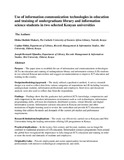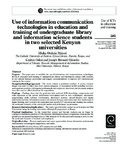| dc.contributor.author | Makori, Elisha Ondieki | |
| dc.contributor.author | Odini, Cephas | |
| dc.contributor.author | Ojiambo, Joseph Bernard | |
| dc.date.accessioned | 2014-06-25T12:47:12Z | |
| dc.date.available | 2014-06-25T12:47:12Z | |
| dc.date.issued | 2013 | |
| dc.identifier.citation | Elisha Ondieki Makori, Cephas Odini, Joseph Bernard Ojiambo, (2013) "Use of information communication technologies in education and training of undergraduate library and information science students in two selected Kenyan universities", Library Review, Vol. 62 Iss: 8/9, pp.585 - 601 | en_US |
| dc.identifier.uri | http://hdl.handle.net/11295/71093 | |
| dc.description.abstract | Purpose – The paper aims to establish the use of information and communications technologies (ICTs) in education and training of undergraduate library and information science (LIS) students in two selected Kenyan universities and suggest recommendations to improve ICT education and training in the country.
Design/methodology/approach – The study utilised a qualitative method. A survey research design was used to collect data from various categories of respondents in LIS including lecturers, undergraduate students, information professionals and employers. Interviews and document analysis were also used to collect data from the respondents.
Findings – Findings show that the graduates lack preferred ICTs knowledge, competencies and skills important in the modern information environment such as web technologies, information programming skills, software development, distributed systems, virtual libraries and digital information systems. Information sciences education in Kenyan universities and other institutions of higher learning need to review the curriculum and provide ICT education and training that address the needs and demands of the current job market and performance requirements.
Research limitations/implications – The study was effectively carried out at Kenyatta and Moi Universities being the leading universities offering LIS programmes in Kenya.
Practical implications – In the twenty-first century and beyond, students can no longer be confined to traditional practices of LIS education. Information sciences programmes from around the global have recognized the importance to fully integrate ICTs education and training in order to meet the needs and demands of students and employers.
Originality/value – Present employment and career opportunities favour information professionals with intensive technological competencies and skills. | en_US |
| dc.language.iso | en | en_US |
| dc.publisher | University of Nairobi | en_US |
| dc.title | Use of information communication technologies in education and training of undergraduate library and information science students in two selected Kenyan universities | en_US |
| dc.type | Thesis | en_US |


